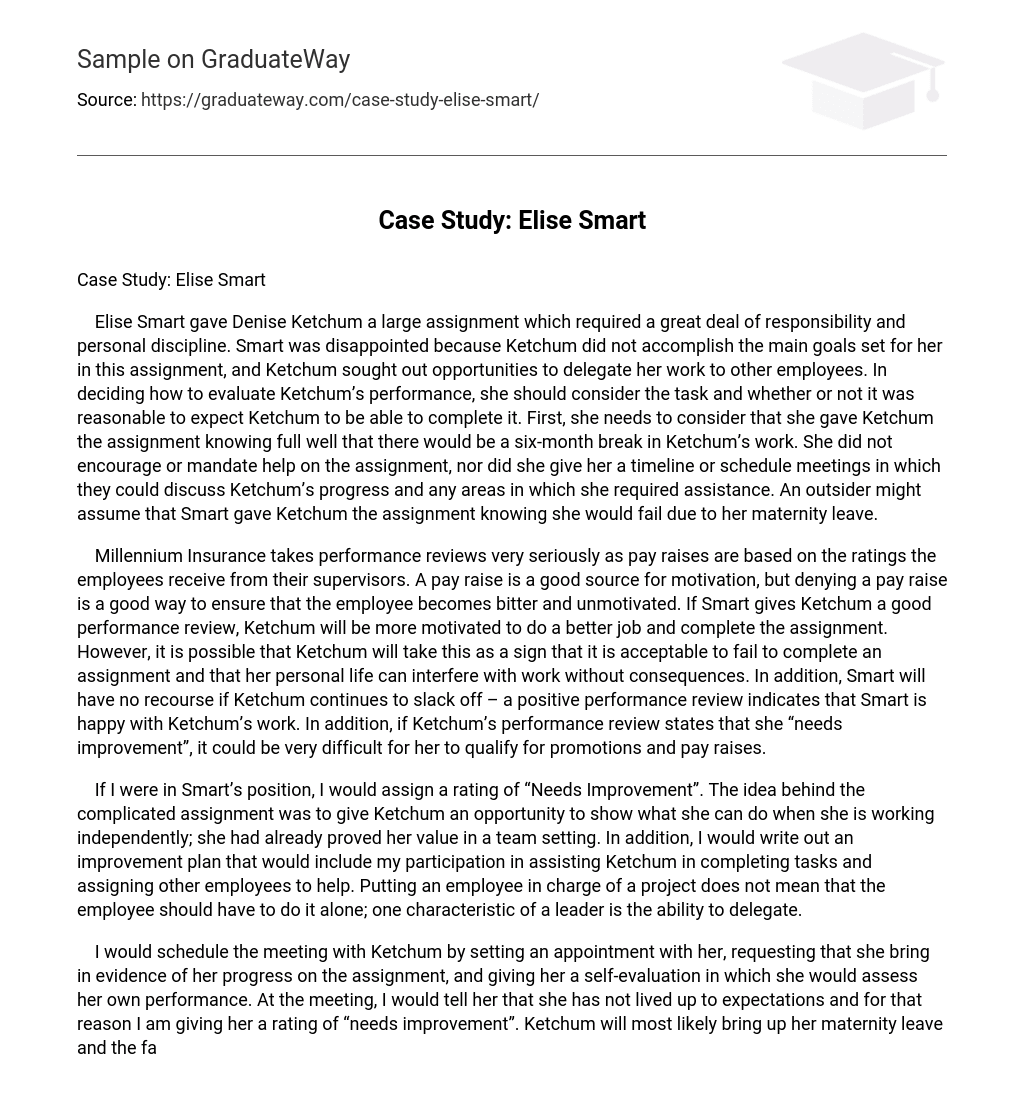Elise Smart gave Denise Ketchum a large assignment which required a great deal of responsibility and personal discipline. Smart was disappointed because Ketchum did not accomplish the main goals set for her in this assignment, and Ketchum sought out opportunities to delegate her work to other employees. In deciding how to evaluate Ketchum’s performance, she should consider the task and whether or not it was reasonable to expect Ketchum to be able to complete it. First, she needs to consider that she gave Ketchum the assignment knowing full well that there would be a six-month break in Ketchum’s work. She did not encourage or mandate help on the assignment, nor did she give her a timeline or schedule meetings in which they could discuss Ketchum’s progress and any areas in which she required assistance. An outsider might assume that Smart gave Ketchum the assignment knowing she would fail due to her maternity leave.
Millennium Insurance takes performance reviews very seriously as pay raises are based on the ratings the employees receive from their supervisors. A pay raise is a good source for motivation, but denying a pay raise is a good way to ensure that the employee becomes bitter and unmotivated. If Smart gives Ketchum a good performance review, Ketchum will be more motivated to do a better job and complete the assignment. However, it is possible that Ketchum will take this as a sign that it is acceptable to fail to complete an assignment and that her personal life can interfere with work without consequences. In addition, Smart will have no recourse if Ketchum continues to slack off – a positive performance review indicates that Smart is happy with Ketchum’s work. In addition, if Ketchum’s performance review states that she “needs improvement”, it could be very difficult for her to qualify for promotions and pay raises.
If I were in Smart’s position, I would assign a rating of “Needs Improvement”. The idea behind the complicated assignment was to give Ketchum an opportunity to show what she can do when she is working independently; she had already proved her value in a team setting. In addition, I would write out an improvement plan that would include my participation in assisting Ketchum in completing tasks and assigning other employees to help. Putting an employee in charge of a project does not mean that the employee should have to do it alone; one characteristic of a leader is the ability to delegate.
I would schedule the meeting with Ketchum by setting an appointment with her, requesting that she bring in evidence of her progress on the assignment, and giving her a self-evaluation in which she would assess her own performance. At the meeting, I would tell her that she has not lived up to expectations and for that reason I am giving her a rating of “needs improvement”. Ketchum will most likely bring up her maternity leave and the fact that she had to catch up on work dynamics when she returned. I would inform her that she cannot be held back due to maternity leave, but at the same time she cannot expect special treatment. At this point, I would turn the tone of the meeting around and offer Ketchum a written list of suggestions for improvement and I would ask her how I could help in this process. Ketchum probably has several complaints, one of them being that the assignment was difficult and that she did not have enough assistance. In response, I would remind her that she is on the track to promotions and leadership; a leader must be able to handle large assignments independently.
In conclusion, I would inform Denise Ketchum of her options in regard to fighting the performance review. The best thing I can do for the company is to encourage her not to fight the performance review until she has had a chance to ponder how she could improve.





